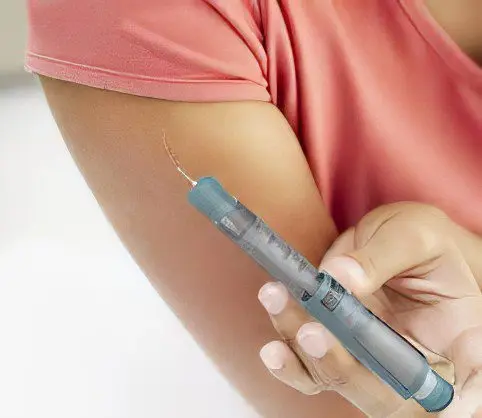Contents
What is hyperglycemia?

Hyperglycaemia – a clinical symptom indicating an increased content of sugar (glucose) in the blood serum. Hyperglycemia appears mainly in diabetes mellitus or other diseases of the endocrine system.
There are several conditional degrees of symptom severity:
– mild hyperglycemia (sugar level is 6-10 mmol / l); – moderate hyperglycemia (10–16 mmol/l); – severe hyperglycemia (more than 16 mmol / l).
If the sugar level exceeds 16,5 mmol / l, a pre-coma or coma may occur.
There are two types of hyperglycemia in people with diabetes:
– hyperglycemia on an empty stomach (if a person has not eaten for about 8 hours, the blood sugar level rises more than 7,2 mmol / l);
– postprandial hyperglycemia (after eating, the blood sugar level exceeds 10 mmol / l).
If in non-diabetic people, after a heavy meal, the sugar level rises to 10 mmol / l, this indicates an increased risk of developing type 2 diabetes.
Patients with diabetes mellitus should closely monitor blood glucose levels, since with prolonged periods of hyperglycemia there is a risk of developing damage to nerves, blood vessels, and other dangerous conditions (ketoacidosis, coma).
To avoid serious complications of diabetes, it is necessary to detect the symptoms of hyperglycemia in time and treat them.
Causes of hyperglycemia
The main reason for the occurrence of hyperglycemia is a low amount of insulin (a hormone that reduces the concentration of glucose in the blood). Sometimes also insulin cannot properly interact with the cells of the body in order to utilize glucose.
There are many reasons for the development of hyperglycemia, including overeating, eating high-calorie foods containing an increased amount of simple and complex carbohydrates.
Stress can also be a non-diabetic cause of hyperglycemia. It is necessary to control your physical activity: severe overwork or, on the contrary, a passive lifestyle can lead to an increase in blood sugar levels.
Infectious and chronic diseases can also cause symptoms of hyperglycemia. In people with diabetes, hyperglycemia may occur due to a missed dose of sugar-lowering drugs or an insulin injection.
Symptoms of hyperglycemia
Timely detection of symptoms of hyperglycemia will help to avoid serious complications. First of all, you need to pay attention to strong thirst: if the glucose concentration is more than 10 mmol / l, sugar is excreted along with urine. Together with it, useful salts are washed away, which causes weakness, headache, dry mouth, itchy skin, weight loss, blurred vision, and loss of consciousness. Cold and insensitive extremities, constipation, diarrhea, and other gastrointestinal problems can also be symptoms of hyperglycemia.
Hyperglycemia can provoke ketonuria (the presence of acetone bodies in the urine) and ketoacidosis (a violation of carbohydrate metabolism leading to a diabetic coma). The action of this mechanism is as follows: due to the high amount of sugar in the blood and the lack of insulin, glucose does not enter the cells. Therefore, the liver, which contains glycogen, begins to break it down to glucose, which further increases the amount of sugar. Cells do not receive energy, and the breakdown of fats begins, during which ketone bodies (acetone) are produced. They enter the bloodstream, as a result of which the natural acid balance is disturbed.
In people with diabetes mellitus, the transition of hyperglycemia from mild to more severe can take many years. But this is only if the body is able to produce insulin on its own. Therefore, much effort must be made to treat the disease.
You should be aware that hyperglycemia is not an indicator of diabetes only, but may also indicate other endocrine diseases.
Hyperglycemia Treatment

First of all, a person suffering from hyperglycemia must regularly measure the amount of sugar in the blood. They should be carried out both on an empty stomach and after meals, several times a day. If elevated rates are registered several times in a row, you should consult a doctor, as this can cause damage to blood vessels and organs, leading to various complications.
The concentration of glucose in the blood will help reduce moderate exercise, drinking plenty of fluids (with high glucose levels, you need to drink every 30 minutes). But physical activity must be stopped if the sugar level is elevated to 13,3 mmol / l, and ketone bodies are present in the urine.
With hyperglycemia, it is extremely important to follow a diet, but this should be done only after consulting with your doctor. Under control you need to keep the amount of carbohydrates and calories contained in the food consumed.
Insulin is often prescribed to treat hyperglycemia.
Hyperglycemia in children

In children, an indicator of hyperglycemia is a blood sugar concentration of more than 6,5 mmol / l before a meal and more than 8,9 mmol / l after a meal.
In newborns, hyperglycemia is quite common, but doctors do not give an unequivocal answer to the question of what exactly causes the increase in blood sugar levels in babies. Basically, hyperglycemia occurs in children who weigh less than 1,5 kg, or who have had such serious diseases as meningitis, sepsis, encephalitis, and so on. Sometimes the concentration of sugar in the blood rises due to intravenous administration of glucose solutions (in children with low weight, glucose in the body is not processed intensively enough).
If hyperglycemia is not detected and treated in time, the child’s brain cells may malfunction, which often leads to hemorrhage or cerebral edema. With hyperglycemia, the body is dehydrated, so there is a risk of weight loss, the development of diseases of the endocrine system.
To avoid hyperglycemia, it is necessary to constantly monitor the performance of urine and blood tests. If the glucose levels are exceeded, the child is given insulin.
Often, blood sugar levels can indicate the severity of a child’s condition, which can later lead to death.









